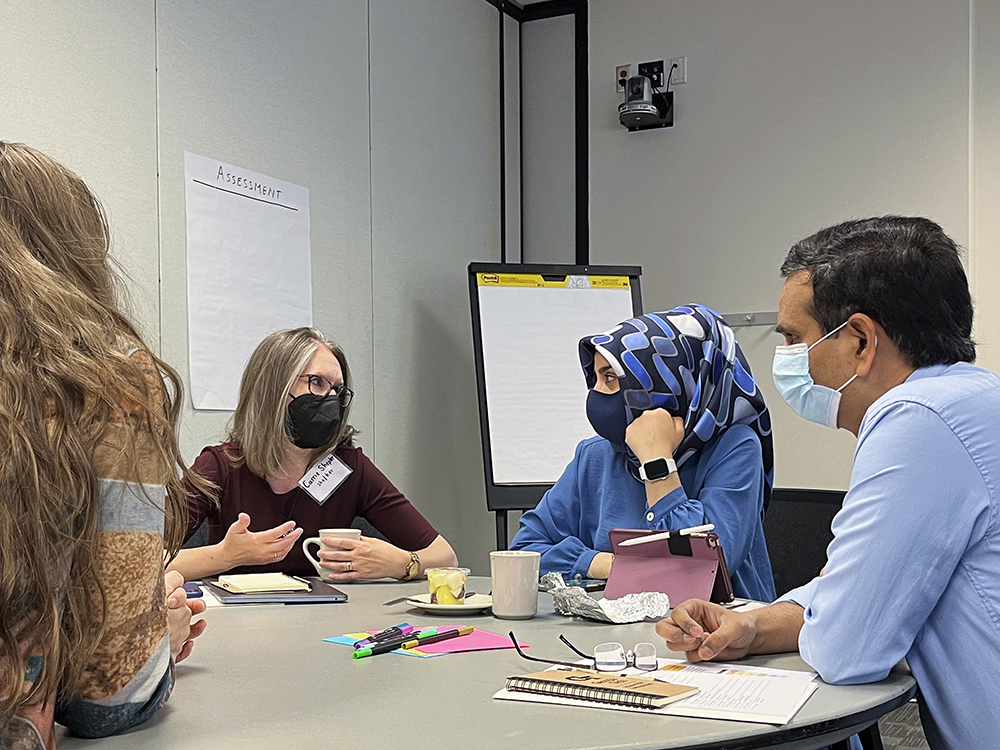
A collaboration between the Colleges of Computing, Engineering, and Sciences, along with the Center for Teaching and Learning and Institute Diversity, Equity, and Inclusion helps faculty members adopt and advance inclusive teaching practices.
An integral part of Georgia Tech’s new Diversity, Equity, and Inclusion Plan is the Institute’s commitment to supporting innovative and inclusive scholarship and teaching. The Inclusive STEM Teaching Fellows Program, a collaborative partnership between the College of Sciences, College of Engineering, the College of Computing, the Center for Teaching and Learning, and Institute Diversity, Equity, and Inclusion is poised to help accomplish that goal.
In its inaugural year, 19 faculty members completed the Inclusive STEM Teaching Fellows program, which aimed to provide a space for Georgia Tech faculty who are interested in increasing inclusivity in their teaching, and learning communities to collaborate, learn, grow, and develop community. Participants completed the five-week Inclusive STEM Teaching Project massive online open course (MOOC) provided by the National Science Foundation. The course explores power, privilege, and positionality; instructor and student identity; and inclusive course design and implementation practices. The Inclusive STEM Teaching Fellows Program culminated in a two-day institute on May 11–12 where participants and a group of nine facilitators discussed how to put the practices they learned about into action.
“The NSF’s STEM Teaching Project strongly encourages participation in learning communities while completing the asynchronous course,” said Jennifer Leavey, assistant dean for faculty mentoring in the College of Sciences. “We wanted to put a spin on that idea. Rather than running a learning community in conjunction with the online course, we opted to host a two-day intensive, during which participants could dig into the details of the material and share ideas and experiences.”
Six faculty members from the College of Sciences and the Center for Teaching and Learning completed facilitator training and hosted two pilot synchronous learning communities in summer and fall 2021.
“We proposed the institute as a way to help faculty carve out dedicated time to focus on the concepts covered in the online course and better understand how to put them into practice,” said Carrie Shepler, assistant dean for teaching effectiveness in the College of Sciences. “Having two days to delve into the material and focus on application provided a huge advantage to our participants, and ourselves.”
Participants expressed a clear desire for continued access to resources during the Institute, according to Kate Williams, assistant director of teaching assistant development and future faculty initiatives with the Center for Teaching and Learning.
“One of our ultimate goals was to develop a community of faculty who are dedicated to intentional inclusion in their teaching spaces,” Williams said. “We noticed that participants specifically were interested in understanding how their peers teaching similar classes and facing the same barriers to creating inclusive learning spaces navigate those challenges.”
“Programs such as these, in which faculty come together in community to question, learn, and reflect on how to make their teaching more inclusive and their classrooms more welcoming and equitable for all students, are critical to achieving the cultural transformations we are seeking for teaching, research, and scholarship at Georgia Tech,” said Diley Hernández, associate vice president for Institute Diversity, Equity, and Inclusion. “My hope is that the conversations and experiences shared in this program will continue among faculty as we grow this community and continue to tackle these important issues.”
The program was funded through the Howard Hughes Medical Institute’s Inclusive Excellence 3 Community Cluster grant, secured by the College of Sciences, with additional support provided by the College of Engineering and the College of Computing.
For more information about the program, contact Carrie Shepler at carrie.shepler@cos.gatech.edu.